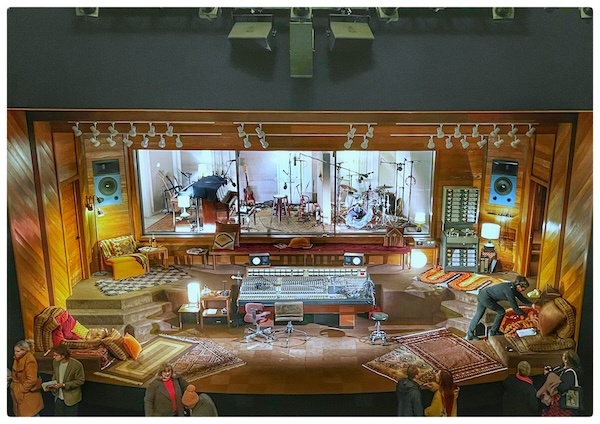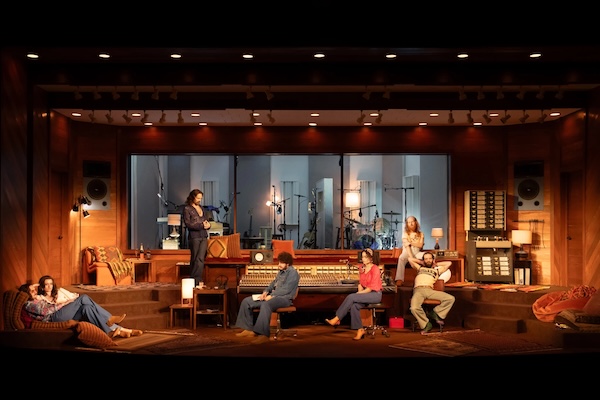NYC Theater Reviews: “Stereophonic” and “Babe” — The Music Business Onstage
By Tim Jackson
Both Stereophonic and Babe make compelling drama out of the volatile world of pop music-making.

The set of Stereophonic. Photo: Tim Jackson
The recording of Fleetwood Mac’s 1977 album Rumours has a storied history of drugs and interpersonal battles. Rolling Stone reported that the band considered thanking their coke dealer on the album credits. It was also, in the words of Ken Caillat, co-author of the book Making Rumours, “A perfect album made out of the flaws of the human spirit.” In the mid-’70s record companies supported excessive artistic visions — as long as they saw dollar signs. The album has since sold over 40 million copies.
The play Stereophonic, currently on Broadway after a run at Playwrights Horizon, is loosely based on the creation of that record. Written by David Adjmi, with music by Will Butler of Arcade Fire, the play garnered 13 Tony Award nominations with five wins at this year’s ceremonies, including Best Play.
How close is the play to fact? Ken Caillat, who was also the producer and engineer of the Rumours album, came to an undisclosed settlement on December 3 against playwright Adjmi, the Broadway producers, the theater owner, and nonprofit developers of the play for alleged copyright infringement. He claimed that the script had duplicated the arc of the book he co-wrote with Steven Stiefel.
Set in 1976, Stereophonic does more than chronicle one group’s conflicts. There is no blueprint for making a great rock record, particularly when each member of a group inevitably has their own agenda. On top of that, the volatility of the creative process during that era was all too typical. Drugs and money flowed, blistering arguments erupted over creative direction, egos clashed, and personal relationships shattered.
Like Fleetwood Mac, there are roles for two songwriting couples. Other characters include an often inebriated bass player, and a drummer who tries his best to keep tempers in check. Disputes rattle self-confidence. Spats arise about which songs ought to be included, how parts are played, how songs are sung, whether tempos are correct and steady, or if the sound of an instrument best serves the production of a song. Flailing tempers are fueled by liquor, drugs, and endless days, months, and years of production. The engineer and his assistant provide some comic relief but they don’t escape band members’ fits of rage.
Having spent much time in recording studios during the ’70s, I can attest to the testy atmosphere generated after spending hours in the cloistered world of a dark recording room, though my own experience comes nowhere close to this acrimonious level. And the stakes are enormously high here: each member of the group contributes a distinctive talent that’s backed by a powerful ego. Maintaining a balance and a consistent vision becomes difficult when the collaborative process is this volatile.

The cast of Stereophonic. Photo: Julieta Cervantes
In the two-hour first act the personality of each band member is defined, their eccentricities targeted for humor. Will Brill, who won a Tony for Best Performance by a Featured Actor, is Reg, the liquor-swilling bass player who periodically straightens himself out with lines of coke. He rambles on philosophically until he becomes lost in his own addled thoughts. Despite this, his playing rarely falters. Another Tony nomination went to Tom Pecinka as Peter, the guitarist, who gradually tries to assume creative control of what becomes a succession of endless sessions, to the dismay of his wife, Diana, played by Sarah Pidgeon. Suddenly, at the cusp of solo success (think Stevie Nicks), she resents his intrusions into her songwriting and advice about her singing. The second vocalist, Holly, played by Juliana Canfield, is in a relationship with Reg, whose volatility and substance abuse require enormous patience. Both of these actresses turn out to be terrific singers.
Some of the funniest moments go to Chris Stack, as the drummer Simon, who tries to maintain an equilibrium between warring parties. Andrew R. Butler and Eli Gelb are Charlie and Grover, the engineer and his assistant. Some of their demands are right out of the ’70s playbook: three days are spent trying to achieve the perfect snare drum sound (there is a story that five days were spent modulating Mick Fleetwood’s drum sounds). Charlie coerces Simon into using a “click track” (a computer-generated or app-created audio track) when he feels the tempo is wavering or is speeding up — a bone of contention among drummers at the time. It turns out that Charlie scored the engineering job for the session by lying about his previous experience. His reputation is at stake, so he maintains the patience of Job, putting up with all manner of demands and accusations. “The world is pain,” he confesses to Simon. His low expectations and stoicism may be what saved the day. Stringy-haired Grover, endlessly befuddled and subservient, makes for refreshing servings of comic relief.
The Tony-winning set design perfectly duplicates an analog recording studio. The engineer works at a control console as tape machines whir in real time. Soundproof glass separates the control room from an upstage performing area, which is complete with a keyboard, acoustic piano, amplifiers and a full drum set. All the musicians play their instruments live.

A scene from Jessica Goldberg’s Babe. Photo: Monique Carboni
The Pershing Square Signature Center presents another play about the music industry, Jessica Goldberg’s Babe. Produced by The New Group, it is a look at the contemporary music industry from a feminist perspective. With an ensemble of three actors, the drama builds its conflicts around the disconnect between different generations. Arliss Howard is Gus, a cocksure longtime hit-maker of platinum records. Gracie McGraw plays Katherine, a 25-year-old woman who appears at Gus’s office, eager for an A&R position. We quickly see that she represents a generation of female artists whose progressive ideas will dictate where music should be headed. Caught between two world views is Abby (Marisa Tomei); she is Gus’s creative assistant and her taste and vision have been pivotal to her boss’s success.
At her first interview, Katherine cautiously accommodates Gus’s macho attitude about his success, playing down the steely confidence she has in her own vision for the future of pop music. Obviously, a culture clash looms. One thinks of how Taylor Swift, Lady Gaga, Beyoncé, and others have eclipsed the spotlight once held by male glam bands like Van Halen or Poison.
Meanwhile Katherine sows seeds of doubt in Abby about the older woman’s willing subservience to a male-dominated business. The attacks chip away at her soul. Hired decades earlier, when she was in her impressionable early 20s, Abby still calls this her “dream job.” Still, compromises have taken their toll. Abby has received little recognition for her contributions. Still single, and well into middle age, her decades of sacrifice are underlined (perhaps a bit too strongly) in the fact that she is a cancer survivor with a double mastectomy. Tomei does a fine job of infusing Abby with a sexiness and spirit that hides the character’s psychic and physical pain. The music business adds a fresh twist to what has become a familiar struggle: a woman whose career is in conflict with her personal life.
Each character’s deeper truths and flaws continually shift our allegiances from one to the next. We root for Abby but are frustrated by her concessions to patriarchy. Gus may be intolerable, but he knows the system, as evidenced by his long career fashioning hit-makers. As much as Katherine may be urging progress, she has the sense of entitlement characteristic of her generation. She navigates her way through the intrigues of the music business butting heads with Gus, who remains obstinate, sexist, and unerringly confident. He delivers a short speech to Katherine that, while obnoxious, contains unfortunate truths.
You’re a smart girl. You’ve got poise, you’re motivated. You don’t give up. You push back. And you’re attractive, which I didn’t say. We’re not allowed to say things like that anymore. So, you didn’t hear it, not from my mouth. But it matters. There’s an ease attractive people have with each other. Most of the artists we work with are attractive and they respond to other attractive people, they like to be around people they can imagine themselves fucking.
It is worth mentioning that Gracie McGraw, the daughter of Tim McGraw and Faith Hill, is a fine young singer in her own right. Before the show ends in an angry revelatory moment, she will cut loose in a song that justifies the wait.
Tim Jackson was an assistant professor of Digital Film and Video for 20 years. His music career in Boston began in the 1970s and includes some 20 groups, recordings, national and international tours, and contributions to film soundtracks. He studied theater and English as an undergraduate, and has also worked helter-skelter as an actor and member of SAG and AFTRA since the 1980s. He has directed three feature documentaries: Chaos and Order: Making American Theater about the American Repertory Theater; Radical Jesters, which profiles the practices of 11 interventionist artists and agit-prop performance groups; When Things Go Wrong: The Robin Lane Story. And two short films: Joan Walsh Anglund: Life in Story and Poem and The American Gurner. He is a member of the Boston Society of Film Critics. You can read more of his work on his blog.
Tagged: "Babe", "Rumors", "Stereophonic", David Adjmi, Jessica Goldberg
